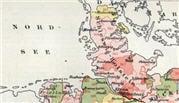Source Information
About Speyer, Germany, Deaths, 1876-1918
About this collection
This collection contains death records from Speyer covering the years 1876 up to and including 1918. Speyer, (also spelled "Speier" until 1825) is located about 12 miles south of Ludwigshafen and Mannheim in the Rhine-Neckar Metropolitan Region of the Upper Rhine. Speyer is one of the independent cities in the state of Rhineland-Palatinate which was established in 1946.
Founded by the Romans, Speyer is one of the oldest cities in Germany and home to the Speyer Cathedral, a UNESCO World Heritage Site. During the time period of this collection, Speyer belonged to the Kingdom of Bavaria.
Beginning on January 1, 1876, birth, marriage and death records in the former German Empire were created by local registry offices. The collected records are arranged chronologically and usually bound together in the form of yearbooks. These are collectively referred to as "civil registers." Occasionally, alphabetical directories of names were also created. While churches continued to keep traditional records, the State also mandated that the personal or marital status of the entire population be recorded.
What you can find in the records
Death records were created using preprinted forms that were filled in by hand by the registrar. In each record the date of death usually differs from the date it was registered. Depending on the individual form or on the formulations used by the registrar, you may find:
- Sequential or Certificate Number
- Registration Date
- Informant: Occupation, Given Names, Last Name, Residence/Address
- Deceased: Given Names, Last Name, Maiden Name, Age, Denomination, Residence/Address, Birthplace, Spouse/Parents, Place/Date of Death, Time of Death
- Signatures
More about using this collection
Each record comprises one page. Additional events from the life of the deceased were sometimes recorded later on in the margins. These notes, sometimes referred to as "narration," can contain very useful information but they have not been indexed. As a result, information from the notes will not found via the search form. The “Informant” was usually a relative of the deceased.
 Need help with the German language? Find resources in our German Research Center.
Need help with the German language? Find resources in our German Research Center.